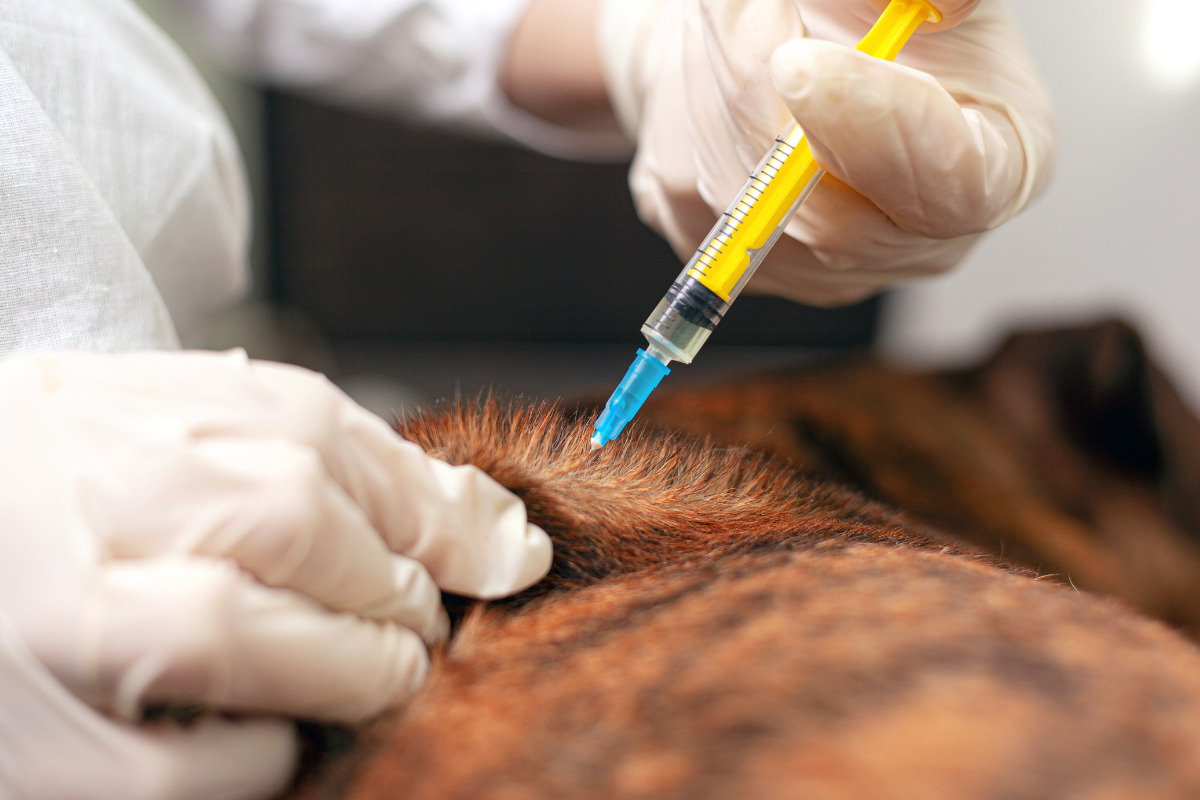Home>Health & Wellness>Behavior & Cognitive Care>How Much Glucosamine For A Senior Dog


Behavior & Cognitive Care
How Much Glucosamine For A Senior Dog
Published: February 2, 2024
Discover the ideal dosage of glucosamine for your senior dog's behavior and cognitive care. Learn how to support your pet's health and mobility with the right amount of glucosamine.
(Many of the links in this article redirect to a specific reviewed product. Your purchase of these products through affiliate links helps to generate commission for Pawsomeoldies.com, at no extra cost. Learn more)
Table of Contents
Introduction
As our beloved canine companions age, they may experience joint issues and mobility challenges. Just like humans, senior dogs can develop arthritis, hip dysplasia, and other musculoskeletal conditions that affect their quality of life. To address these concerns, many pet owners turn to glucosamine supplements to support their furry friends' joint health and alleviate discomfort.
Understanding the role of glucosamine in promoting mobility and comfort for senior dogs is crucial for pet owners seeking to provide the best care for their aging companions. This article delves into the recommended dosage of glucosamine for senior dogs, factors to consider when determining the right amount, and potential side effects of glucosamine overdose. By gaining insight into these aspects, pet owners can make informed decisions to enhance their senior dogs' well-being and vitality.
The journey of caring for a senior dog involves compassion, patience, and a deep understanding of their evolving needs. By exploring the benefits and considerations surrounding glucosamine supplementation, pet owners can take proactive steps to support their senior dogs' joint health, enabling them to enjoy a comfortable and active lifestyle as they gracefully navigate their golden years.
Read more: How Much Fish Oil Capsule For 6lb Senior Dog
Understanding Glucosamine for Senior Dogs
Glucosamine is a natural compound found in the body, particularly in the fluid surrounding the joints. It plays a vital role in maintaining the health and function of cartilage, which acts as a cushion between the bones in a joint. As dogs age, the production of glucosamine in their bodies may decrease, leading to a decline in joint health and mobility. This decline can result in discomfort, stiffness, and reduced activity levels, impacting the overall well-being of senior dogs.
Supplementing senior dogs with glucosamine can help replenish the diminishing levels of this essential compound, thereby supporting joint function and mobility. Glucosamine supplements are available in various forms, including chewable treats, liquid formulations, and capsules, making it convenient for pet owners to administer the supplement to their furry companions.
When introduced into the body, glucosamine is believed to aid in the repair and maintenance of cartilage, potentially reducing inflammation and promoting smoother joint movement. This can be particularly beneficial for senior dogs experiencing age-related joint issues such as osteoarthritis, as glucosamine may help alleviate discomfort and improve their overall quality of life.
It's important to note that while glucosamine is widely used to support joint health in senior dogs, its effectiveness can vary from one dog to another. Factors such as the severity of joint issues, overall health status, and individual response to supplementation can influence the outcomes. Therefore, pet owners should closely monitor their senior dogs' response to glucosamine and consult with a veterinarian to determine the most suitable approach for their specific needs.
Understanding the role of glucosamine in supporting the joint health of senior dogs empowers pet owners to make informed decisions regarding their furry companions' well-being. By incorporating glucosamine supplementation into their senior dogs' care routine, pet owners can take proactive steps to promote comfort, mobility, and vitality as their loyal companions gracefully navigate the aging process.
Recommended Dosage of Glucosamine for Senior Dogs
Determining the appropriate dosage of glucosamine for senior dogs is crucial to ensure optimal joint support without the risk of over-supplementation. The recommended dosage can vary based on factors such as the dog's size, weight, and overall health status. While it's essential to consult with a veterinarian to obtain personalized guidance, general dosage guidelines can provide a helpful starting point for pet owners.
For senior dogs, the typical recommended dosage of glucosamine ranges from 500mg to 1000mg per day, depending on the severity of joint issues and the dog's size. Smaller breeds may require a lower dosage, while larger breeds may benefit from a higher dosage to effectively support their joint health. It's important to note that the dosage may need to be adjusted based on the individual dog's response and any concurrent treatments they may be receiving.
When selecting a glucosamine supplement for senior dogs, pet owners should opt for high-quality products specifically formulated for canine use. These supplements often contain additional ingredients such as chondroitin sulfate and MSM (Methylsulfonylmethane) to enhance joint support and overall efficacy. Additionally, the form of the supplement, whether it's in the form of chewable treats, liquid, or capsules, should align with the dog's preferences and ease of administration for the pet owner.
While glucosamine is generally well-tolerated by dogs, it's essential to introduce the supplement gradually and monitor the dog for any adverse reactions. Close observation of the dog's mobility, comfort levels, and overall well-being can help determine the effectiveness of the chosen dosage. Any concerns or changes in the dog's condition should be promptly discussed with a veterinarian to ensure the best course of action.
By adhering to the recommended dosage guidelines and seeking professional advice when necessary, pet owners can provide their senior dogs with targeted joint support, potentially improving their mobility and overall quality of life. The careful administration of glucosamine supplements underscores the commitment to promoting the well-being of senior dogs, allowing them to age gracefully and comfortably alongside their devoted human companions.
Factors to Consider When Determining the Right Amount of Glucosamine
When determining the appropriate amount of glucosamine for senior dogs, several crucial factors come into play to ensure the optimal support for their joint health and overall well-being. Understanding and carefully considering these factors can guide pet owners in making informed decisions tailored to their furry companions' specific needs.
-
Size and Weight of the Dog: The size and weight of a senior dog play a significant role in determining the right amount of glucosamine. Larger breeds may require a higher dosage to effectively support their larger joints, while smaller breeds may benefit from a lower dosage. Adjusting the dosage based on the dog's size helps ensure that they receive the appropriate level of joint support.
-
Severity of Joint Issues: The severity of a senior dog's joint issues is a critical consideration when determining the amount of glucosamine needed. Dogs experiencing advanced arthritis or significant joint discomfort may benefit from a higher dosage to address their specific needs. Conversely, dogs with milder joint issues may require a lower dosage to maintain joint health and mobility.
-
Overall Health Status: Assessing the senior dog's overall health status is essential in determining the right amount of glucosamine. Dogs with pre-existing health conditions or those taking other medications may require adjustments to their glucosamine dosage to ensure compatibility and safety. Consulting with a veterinarian can provide valuable insights into how glucosamine supplementation aligns with the dog's overall health status.
-
Response to Supplementation: Monitoring the senior dog's response to glucosamine supplementation is crucial in fine-tuning the dosage. Observing changes in the dog's mobility, comfort levels, and overall well-being can help gauge the effectiveness of the chosen dosage. Adjustments may be necessary based on the dog's individual response to ensure that they receive the optimal level of joint support.
-
Quality of the Supplement: The quality and formulation of the glucosamine supplement are important factors to consider. Opting for high-quality products specifically designed for canine use ensures that the senior dog receives a reliable and effective source of glucosamine. Additionally, supplements containing complementary ingredients such as chondroitin sulfate and MSM can enhance joint support, potentially influencing the appropriate dosage.
By carefully considering these factors and seeking guidance from a veterinarian, pet owners can determine the right amount of glucosamine to support their senior dogs' joint health effectively. This personalized approach underscores the commitment to providing tailored care for senior dogs, empowering them to lead comfortable and active lives as cherished members of the family.
Potential Side Effects of Glucosamine Overdose
Overdosing on glucosamine can potentially lead to adverse effects in senior dogs, underscoring the importance of carefully adhering to recommended dosage guidelines. While glucosamine is generally well-tolerated, excessive intake can result in various side effects that may impact the dog's well-being. It's crucial for pet owners to be aware of these potential side effects to safeguard their senior dogs' health and comfort.
-
Gastrointestinal Disturbances: An overdose of glucosamine may lead to gastrointestinal issues such as diarrhea, vomiting, and nausea in senior dogs. These symptoms can cause discomfort and distress, impacting the dog's overall well-being and potentially leading to dehydration if not promptly addressed.
-
Increased Thirst and Urination: Senior dogs experiencing glucosamine overdose may exhibit increased thirst and urination. This can disrupt their usual routine and may indicate an imbalance in their body's fluid regulation, necessitating close monitoring and potential veterinary intervention.
-
Blood Sugar Fluctuations: Glucosamine has the potential to affect blood sugar levels, particularly in diabetic senior dogs. An overdose of glucosamine may lead to fluctuations in blood sugar, posing risks to dogs with diabetes and necessitating careful management to avoid adverse health outcomes.
-
Liver and Kidney Concerns: Excessive glucosamine intake can place additional strain on the liver and kidneys of senior dogs. Prolonged overdose may contribute to organ stress and compromise their function, highlighting the importance of maintaining the appropriate dosage to safeguard the dog's overall health.
-
Allergic Reactions: In some cases, senior dogs may exhibit allergic reactions to glucosamine overdose, presenting symptoms such as itching, swelling, and respiratory distress. Identifying and addressing allergic responses promptly is crucial to prevent further complications and ensure the dog's comfort and well-being.
It's essential for pet owners to be vigilant in monitoring their senior dogs for any signs of glucosamine overdose and to seek veterinary guidance if they suspect an adverse reaction. By maintaining a keen awareness of the potential side effects and promptly addressing any concerns, pet owners can prioritize their senior dogs' safety and comfort while providing targeted joint support through appropriate glucosamine supplementation.
Read more: Why Does My Senior Dog Lick So Much?
Conclusion
In the journey of caring for senior dogs, the role of glucosamine supplementation emerges as a pivotal element in supporting their joint health and overall well-being. As our loyal canine companions gracefully transition into their golden years, it becomes increasingly essential for pet owners to prioritize their comfort, mobility, and vitality. The understanding of glucosamine's significance in addressing age-related joint issues empowers pet owners to make informed decisions that resonate with their senior dogs' evolving needs.
By delving into the recommended dosage of glucosamine for senior dogs, pet owners gain valuable insights into the tailored approach required to provide optimal joint support. The careful consideration of factors such as the dog's size, weight, severity of joint issues, overall health status, and response to supplementation enables pet owners to navigate the dosage determination process with attentiveness and precision. This personalized approach underscores the commitment to delivering targeted care that aligns with the unique requirements of each senior dog, fostering a sense of security and well-being as they navigate the aging process.
Furthermore, the awareness of potential side effects of glucosamine overdose serves as a crucial reminder of the significance of adhering to recommended dosage guidelines. By remaining vigilant and proactive in monitoring their senior dogs' response to glucosamine supplementation, pet owners can mitigate the risks of adverse effects and safeguard their furry companions' health and comfort. This conscientious approach reflects the dedication to providing a nurturing and supportive environment for senior dogs, allowing them to thrive and enjoy their later years with vitality and joy.
In essence, the incorporation of glucosamine supplementation into the care routine of senior dogs embodies a profound commitment to their well-being. It symbolizes the unwavering bond between pet owners and their loyal companions, encapsulating the essence of compassion, empathy, and proactive care. As senior dogs continue to enrich our lives with their unwavering companionship, the thoughtful integration of glucosamine supplementation stands as a testament to the enduring love and devotion shared between humans and their cherished canine counterparts.
Through the collective efforts of pet owners, veterinarians, and caregivers, senior dogs can embark on their aging journey with resilience, comfort, and the freedom to revel in each moment with grace and dignity. The embrace of glucosamine supplementation as a means of supporting their joint health encapsulates the profound commitment to nurturing their well-being, ensuring that they continue to thrive as beloved members of the family, cherished for their wisdom, loyalty, and enduring spirit.














